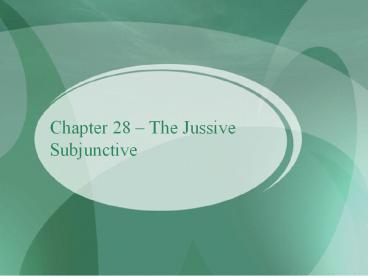Chapter 28 - PowerPoint PPT Presentation
1 / 8
Title: Chapter 28
1
Chapter 28 The Jussive Subjunctive
2
Chapter 28 The Jussive Subjunctive
- The ancient grammarians coined the term
"subjunctive" to indicate its most common use, in
subordinate clauses (subiungo, to join as
subordinate). - But the various subordinate uses are best
understood as developments from the independent
uses.
3
Chapter 28 The Jussive Subjunctive
- The Jussive Subjunctive may be used just like the
IMPERATIVE to give direct commands. - In other words, it is the direct expression of
the duty or obligation that rests on someone. - Unlike the Imperative, however, you may use it in
any number or person.
4
Chapter 28 The Jussive Subjunctive
- So, you could say "Let us do something." or "Let
them die." - Ne is employed in negative commands.
- Its easy to recognize a jussive subjunctive
clause, look for a main verb in the subjunctive.
5
Chapter 28 The Jussive Subjunctive
- In English translation may and should can
sometimes be employed, especially in the second
person - Semper speres
- you should always hope
- let is the English auxiliary most often used,
followed by the subject noun or pronoun.
6
Chapter 28 The Jussive Subjunctive
Examples of the Jussive Subjunctive
Cogitem nunc de hac re, et tum non errabo.
Let me think now about this matter, and then I
will not err.
Amemus patriam.
"let us love the fatherland" ('hortatory").
Amemus patriam?
"Are we to love the fatherland? (deliberative).
7
Chapter 28 The Jussive Subjunctive
Discipulus discat aut discedat.
Let the disciple learn or leave.
Doceamus magna cum delectatione linguam Latinam.
Let us learn the Latin language with great
delight.
8
Chapter 28 The Jussive Subjunctive
Ne id faciamus.
Let us not do this.
Audeant illi viri et feminae esse fortes.
Let those men and women dare to be brave.































